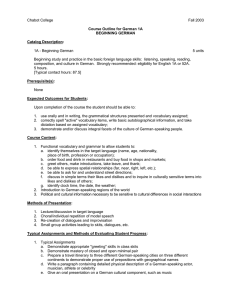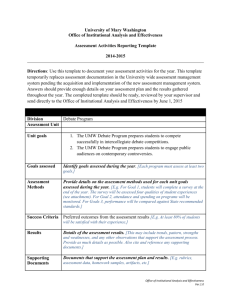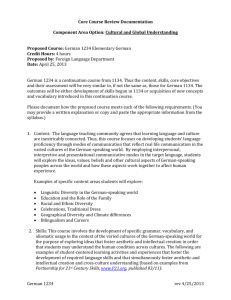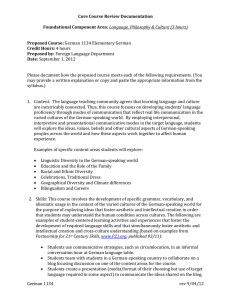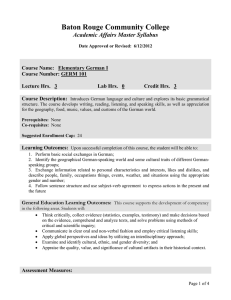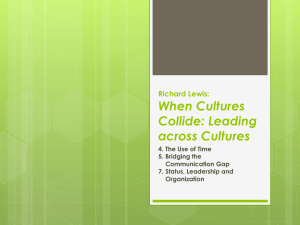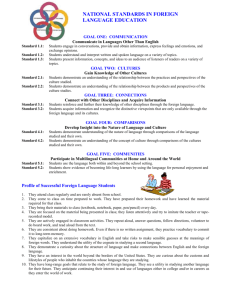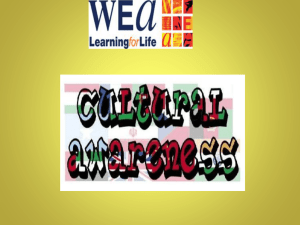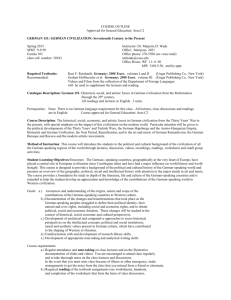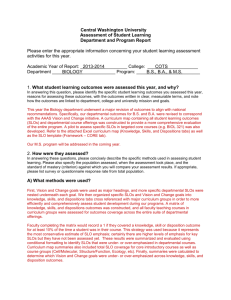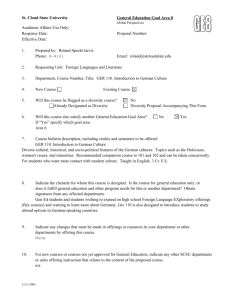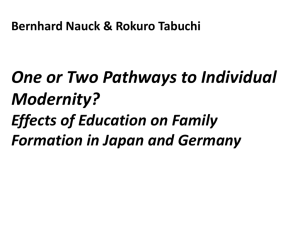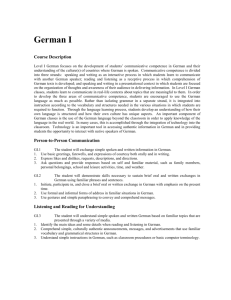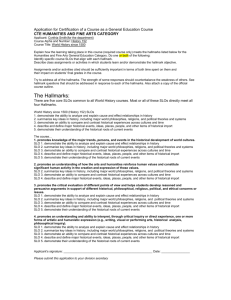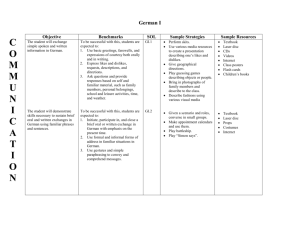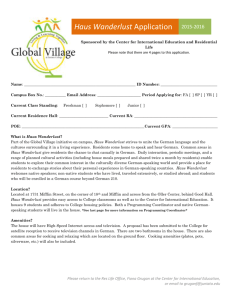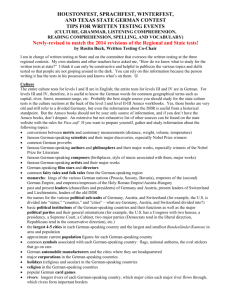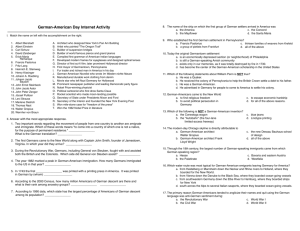German
advertisement
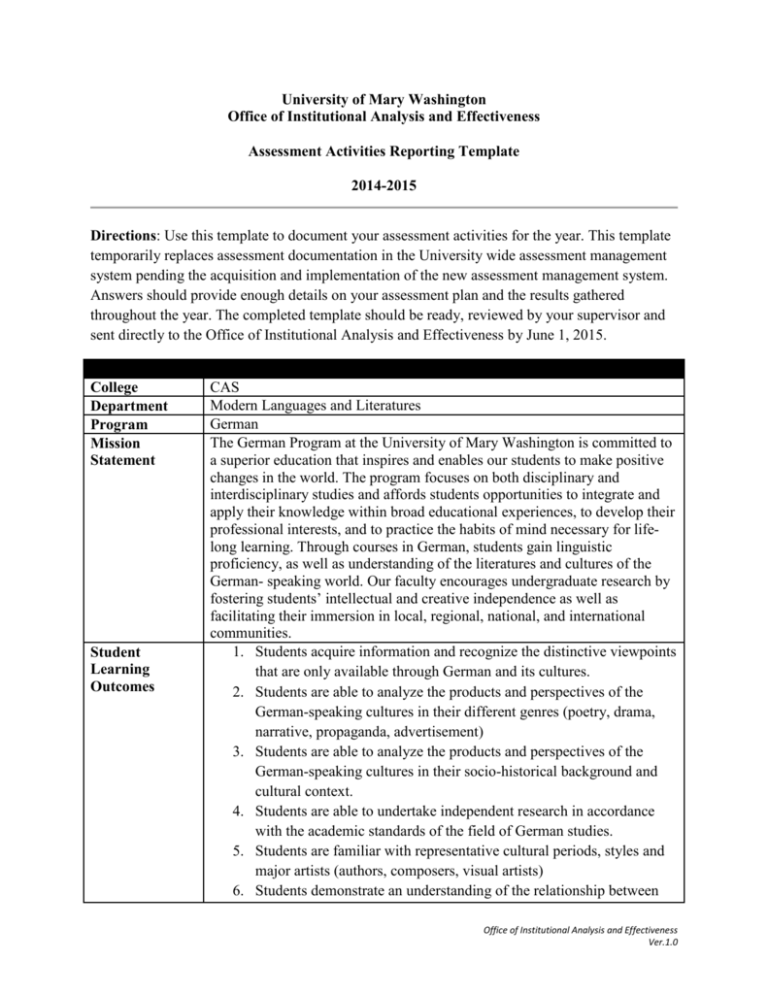
University of Mary Washington Office of Institutional Analysis and Effectiveness Assessment Activities Reporting Template 2014-2015 Directions: Use this template to document your assessment activities for the year. This template temporarily replaces assessment documentation in the University wide assessment management system pending the acquisition and implementation of the new assessment management system. Answers should provide enough details on your assessment plan and the results gathered throughout the year. The completed template should be ready, reviewed by your supervisor and sent directly to the Office of Institutional Analysis and Effectiveness by June 1, 2015. College Department Program Mission Statement Student Learning Outcomes CAS Modern Languages and Literatures German The German Program at the University of Mary Washington is committed to a superior education that inspires and enables our students to make positive changes in the world. The program focuses on both disciplinary and interdisciplinary studies and affords students opportunities to integrate and apply their knowledge within broad educational experiences, to develop their professional interests, and to practice the habits of mind necessary for lifelong learning. Through courses in German, students gain linguistic proficiency, as well as understanding of the literatures and cultures of the German- speaking world. Our faculty encourages undergraduate research by fostering students’ intellectual and creative independence as well as facilitating their immersion in local, regional, national, and international communities. 1. Students acquire information and recognize the distinctive viewpoints that are only available through German and its cultures. 2. Students are able to analyze the products and perspectives of the German-speaking cultures in their different genres (poetry, drama, narrative, propaganda, advertisement) 3. Students are able to analyze the products and perspectives of the German-speaking cultures in their socio-historical background and cultural context. 4. Students are able to undertake independent research in accordance with the academic standards of the field of German studies. 5. Students are familiar with representative cultural periods, styles and major artists (authors, composers, visual artists) 6. Students demonstrate an understanding of the relationship between Office of Institutional Analysis and Effectiveness Ver.1.0 the practices and perspectives of the German-speaking cultures. 7. Students demonstrate understanding of the concept of culture through comparisons of their own and the German-speaking cultures. 8. Students engage in conversation, provide and obtain information, express feelings and emotions, and exchange opinions in a grammatically reasonable correct way. 9. Students present information, concepts, and ideas to an audience of readers on a variety of topics. 10. Students show evidence of becoming life-long learners by using the language for personal enjoyment and enrichment. 11. Students understand and interpret spoken language on a wide variety of topics. 12. Students understand and interpret written language on a wide variety of topics. SLOs assessed Identify SLOs assessed during the year. [Each program must assess at least two learning outcomes.] Assessment Methods Provide details on the assessment methods used for each SLO assessed during the year. [E.g. For SLO 1, students in URES 201 will complete an essay at the end of the year. The essays will be assessed using a rubric that measures four qualities of the paper (see attachment). For SLO 2, a standardized test that measures…will be administered to PHIL 432 students at the beginning and end of the course.] Success Criteria Preferred outcomes from the assessment results [ E.g. At least 80% of students will rank at or above the average level on the rubric. 75% of the students will rank in the 90th percentile of the national average.] Results Details of the assessment results. [This may include trends, pattern, strengths and weaknesses, and any other observations that support the assessment process. Provide as much details as possible. Also cite and reference any supporting documents.] Supporting Documents Documents that support the assessment plan and results. [E.g. rubrics, Assessment Coordinator Supervisor Marcel Rotter assessment data, homework samples, artifacts, etc.] Elizabeth Lewis Office of Institutional Analysis and Effectiveness Ver.1.0 Date Office of Institutional Analysis and Effectiveness Ver.1.0
